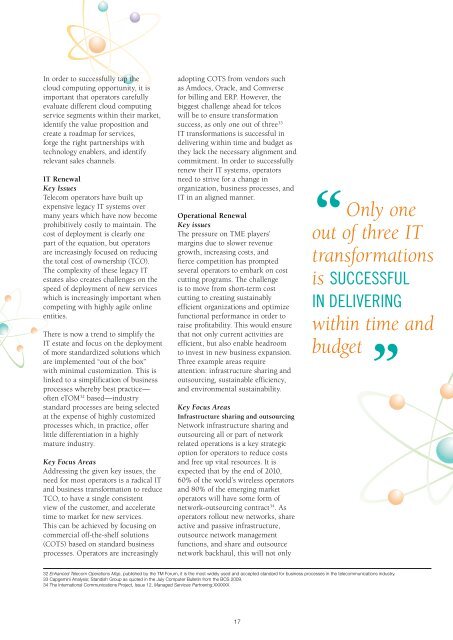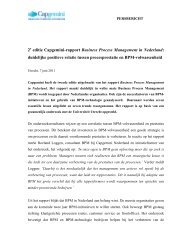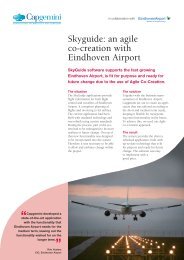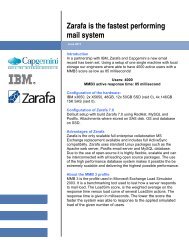IT transformations - Capgemini Consulting Nederland
IT transformations - Capgemini Consulting Nederland
IT transformations - Capgemini Consulting Nederland
You also want an ePaper? Increase the reach of your titles
YUMPU automatically turns print PDFs into web optimized ePapers that Google loves.
In order to successfully tap the<br />
cloud computing opportunity, it is<br />
important that operators carefully<br />
evaluate different cloud computing<br />
service segments within their market,<br />
identify the value proposition and<br />
create a roadmap for services,<br />
forge the right partnerships with<br />
technology enablers, and identify<br />
relevant sales channels.<br />
<strong>IT</strong> Renewal<br />
Key Issues<br />
Telecom operators have built up<br />
expensive legacy <strong>IT</strong> systems over<br />
many years which have now become<br />
prohibitively costly to maintain. The<br />
cost of deployment is clearly one<br />
part of the equation, but operators<br />
are increasingly focused on reducing<br />
the total cost of ownership (TCO).<br />
The complexity of these legacy <strong>IT</strong><br />
estates also creates challenges on the<br />
speed of deployment of new services<br />
which is increasingly important when<br />
competing with highly agile online<br />
entities.<br />
There is now a trend to simplify the<br />
<strong>IT</strong> estate and focus on the deployment<br />
of more standardized solutions which<br />
are implemented “out of the box”<br />
with minimal customization. This is<br />
linked to a simplification of business<br />
processes whereby best practice—<br />
often eTOM 32 based—industry<br />
standard processes are being selected<br />
at the expense of highly customized<br />
processes which, in practice, offer<br />
little differentiation in a highly<br />
mature industry.<br />
Key Focus Areas<br />
Addressing the given key issues, the<br />
need for most operators is a radical <strong>IT</strong><br />
and business transformation to reduce<br />
TCO, to have a single consistent<br />
view of the customer, and accelerate<br />
time to market for new services.<br />
This can be achieved by focusing on<br />
commercial off-the-shelf solutions<br />
(COTS) based on standard business<br />
processes. Operators are increasingly<br />
adopting COTS from vendors such<br />
as Amdocs, Oracle, and Comverse<br />
for billing and ERP. However, the<br />
biggest challenge ahead for telcos<br />
will be to ensure transformation<br />
success, as only one out of three 33<br />
<strong>IT</strong> <strong>transformations</strong> is successful in<br />
delivering within time and budget as<br />
they lack the necessary alignment and<br />
commitment. In order to successfully<br />
renew their <strong>IT</strong> systems, operators<br />
need to strive for a change in<br />
organization, business processes, and<br />
<strong>IT</strong> in an aligned manner.<br />
Operational Renewal<br />
Key issues<br />
The pressure on TME players’<br />
margins due to slower revenue<br />
growth, increasing costs, and<br />
fierce competition has prompted<br />
several operators to embark on cost<br />
cutting programs. The challenge<br />
is to move from short-term cost<br />
cutting to creating sustainably<br />
efficient organizations and optimize<br />
functional performance in order to<br />
raise profitability. This would ensure<br />
that not only current activities are<br />
efficient, but also enable headroom<br />
to invest in new business expansion.<br />
Three example areas require<br />
attention: infrastructure sharing and<br />
outsourcing, sustainable efficiency,<br />
and environmental sustainability.<br />
Key Focus Areas<br />
Infrastructure sharing and outsourcing<br />
Network infrastructure sharing and<br />
outsourcing all or part of network<br />
related operations is a key strategic<br />
option for operators to reduce costs<br />
and free up vital resources. It is<br />
expected that by the end of 2010,<br />
60% of the world’s wireless operators<br />
and 80% of the emerging market<br />
operators will have some form of<br />
network-outsourcing contract 34 . As<br />
operators rollout new networks, share<br />
active and passive infrastructure,<br />
outsource network management<br />
functions, and share and outsource<br />
network backhaul, this will not only<br />
“<br />
Only one<br />
out of three <strong>IT</strong><br />
<strong>transformations</strong><br />
is successful<br />
in delivering<br />
within time and<br />
budget<br />
”<br />
32 Enhanced Telecom Operations Map, published by the TM Forum, it is the most widely used and accepted standard for business processes in the telecommunications industry.<br />
33 <strong>Capgemini</strong> Analysis; Standish Group as quoted in the July Computer Bulletin from the BCS 2009.<br />
34 The International Communications Project, Issue 12, Managed Services Partnering.XXXXXX<br />
17
















